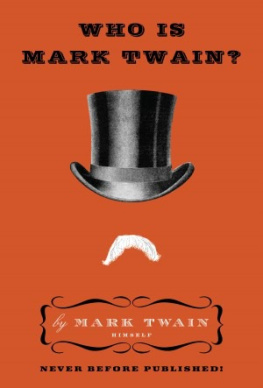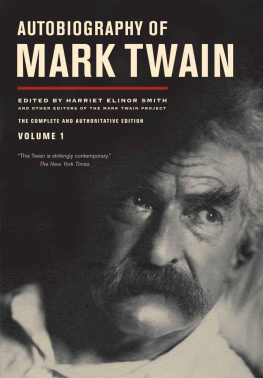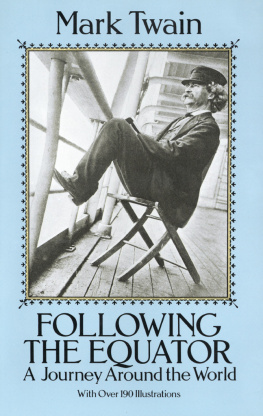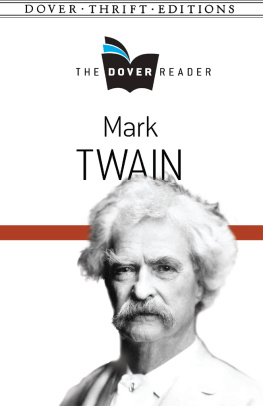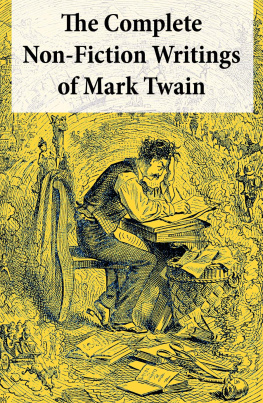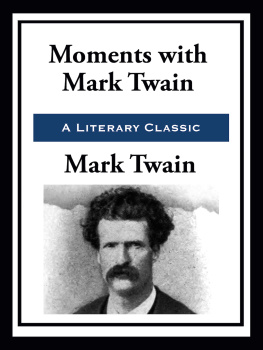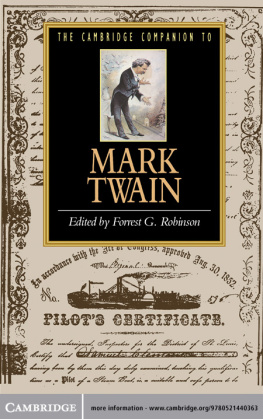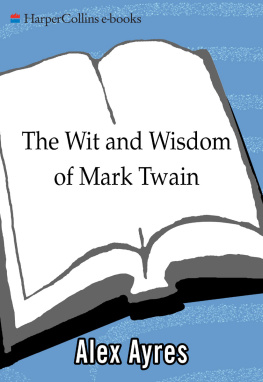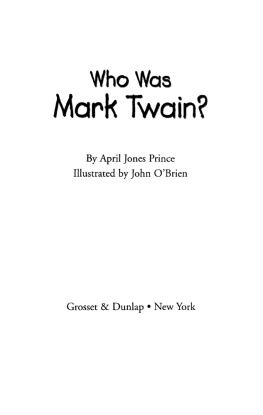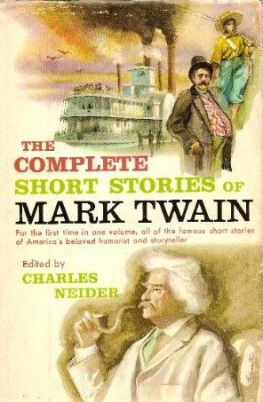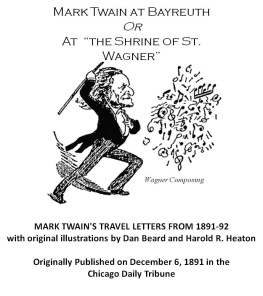Twain - Who Is Mark Twain?
Here you can read online Twain - Who Is Mark Twain? full text of the book (entire story) in english for free. Download pdf and epub, get meaning, cover and reviews about this ebook. City: New York, year: 2010;2009, publisher: HarperStudio, genre: Detective and thriller. Description of the work, (preface) as well as reviews are available. Best literature library LitArk.com created for fans of good reading and offers a wide selection of genres:
Romance novel
Science fiction
Adventure
Detective
Science
History
Home and family
Prose
Art
Politics
Computer
Non-fiction
Religion
Business
Children
Humor
Choose a favorite category and find really read worthwhile books. Enjoy immersion in the world of imagination, feel the emotions of the characters or learn something new for yourself, make an fascinating discovery.
- Book:Who Is Mark Twain?
- Author:
- Publisher:HarperStudio
- Genre:
- Year:2010;2009
- City:New York
- Rating:3 / 5
- Favourites:Add to favourites
- Your mark:
- 60
- 1
- 2
- 3
- 4
- 5
Who Is Mark Twain?: summary, description and annotation
We offer to read an annotation, description, summary or preface (depends on what the author of the book "Who Is Mark Twain?" wrote himself). If you haven't found the necessary information about the book — write in the comments, we will try to find it.
Who Is Mark Twain? — read online for free the complete book (whole text) full work
Below is the text of the book, divided by pages. System saving the place of the last page read, allows you to conveniently read the book "Who Is Mark Twain?" online for free, without having to search again every time where you left off. Put a bookmark, and you can go to the page where you finished reading at any time.
Font size:
Interval:
Bookmark:

Y ou had better shove this in the stove, Mark Twain said at the top of an 1865 letter to his brother, for I dont want any absurd literary remains & unpublished letters of Mark Twain published after I am planted.
Considering that Mark Twain issued that gentle command weeks before he had published his first big success, Jim Smiley and His Jumping Frog, and almost two years before he published his first book, it was a remarkably prescient thing to say, even as a joke. The letter to his brother survives because his brother ignored the instruction to burn it, and Mark Twain himself soon changed his mind about what should be done with his literary remains. Thirty-six years later, in September 1901, he told his good friend Joe Twichell that he had done a grist of writing here this summer, but not for publication soonif ever. I did write two satisfactory articles for early print, but I burnt one of them & have buried the other one in my large box of Posthumous Stuff. Ive got stacks of Literary Remains piled up there.
This time he was clearly not jokingor exaggerating. When Mark Twain died in 1910, he left behind him the largest cache of personal papers created by any nineteenth-century American authorletters, notebooks, a massive autobiography, hundreds of unpublished literary manuscripts, seventy thousand incoming letters, photographs, bills, checks, contracts, and other business documents (easily half a million pages). All but two of the short works published here come from that archive, known as the Mark Twain Papers in The Bancroft Library at Berkeley. The other two (The Devils Gate and I Rise to a Question of Privilege) are among the earliest written, and come from a much smaller group of his manuscripts originally kept for him by his sister Pamela. That group includes two dozen unpublished sketches and essays written as early as age twenty, all of which eventually found their way to the Vassar College Library. These two archives alone show that Mark Twains penchant for preserving manuscripts he did not publish or sometimes even finish was lifelong.
In referring to these manuscripts as stacks of Literary Remains Clemens would seem to imply that he expected some of them to be published, or at least read, after his death (not for publication soonif ever). But how did he really feel about posterity publishing things from his large box of Posthumous Stuff? Arent we trampling on his own best judgment in publishing what he himself decided not to publish? I dont think so. Let me explain why.
When the first half of the manuscript for Huckleberry Finn was discovered in 1991 (Mark Twain had given it to a library, but it had been lost for more than 100 years) it made quite a commotion in the press and even in the world at large. Senator Daniel Patrick Moynihan, for example, is known to have stopped his limousine in front of Sothebys just to see the long-lost manuscript then on display there. The general feeling was, I suppose, that here at last was the authentic text of Mark Twains masterpiece. About this same time, a famous New York publisher called me in Berkeley because, he said, he wanted to know just exactly what the manuscript represented: Was it really the ultimate text for Huck Finn ? I explained that, no, it was actually not Mark Twains final draft, but rather more like a first draft, since he had had his manuscript typed, and then extensively revised that typescript, which in turn became his final draft and went to the typesetter. The New York publisher said: How strange. All of my authors go to great lengths to destroy their early draftspresumably so that no one can tell how they struggled to arrive at the final text.
I think it is clear that, unlike most writers, Mark Twain was not embarrassed by his literary remains even when they were failures. He seems to have been wholly willing to let posterity read them, unafraid of the light they might cast on his talent, or the way he wrote. That unusual willingness to let the world see how he worked, including how he failed or simply misfired, had only one precondition he must not be alive at the time. The following passage from Mark Twains autobiography (31 May 1906), whose full publication he deliberately forbade until 100 years after his death, makes this precondition explicit, and explains why he thought he was taking no real risk in the matter:
I can speak more frankly from the grave than most historians would be able to do, for the reason that whereas they would not be able to feel dead, howsoever hard they might try, I myself am able to do that. They would be making believe to be dead. With me, it is not make-believe. They would all the time be feeling, in a tolerably definite way, that that thing in the grave which represents them is a conscious entity; conscious of what it was saying about people; an entity capable of feeling shame; an entity capable of shrinking from full and frank expression, for they believe in immortality. They believe that death is only a sleep, followed by an immediate waking, and that their spirits are conscious of what is going on here below and take a deep and continuous interest in the joys and sorrows of the survivors whom they love and dont.
But I have long ago lost my belief in immortalityalso my interest in it. I can say, now, what I could not say while alivethings which it would shock people to hear; things which I could not say when alive because I should be aware of that shock and would certainly spare myself the personal pain of inflicting it.
In other words, Mark Twain was perfectly willing to let us read his most intimate manuscripts precisely because he knew that when we did so, he would no longer exist.
Yet whatever intentions Mark Twain had for his manuscripts, as long as his official biographer, Albert Bigelow Paine, had charge of themfrom 1910 to 1937he and the authors only surviving daughter, Clara, had sole access to them and absolute discretion over their publication. Paine, in fact, thought most of the literary manuscripts ought not to be published at all, although he eventually did publish small, heavily edited selections of letters, notebooks, the autobiography, a bastardized form of The Mysterious Stranger, and two or three dozen manuscript sketches. Of course Paine implied that he was carrying out the authors intentions: Mark Twain himself had quite definite ideas as to the disposition of his literary effects, and he left instructions accordinglyinstructions that thus far [ i.e., 1935] have been carried out. But no one except Paine has ever seen even a copy of those instructions, and there are good reasons to doubt that Mark Twain took so protective a view of what he had consistently saved from destruction.
Paines successor as editor of the Mark Twain Papers, Bernard DeVoto, published several dozen more manuscripts, and prepared for publication what he thought were the best of the lot: the unfinished Letters from the Earth and other late stories, which were not, however, published by Harper & Row until 1962, seven years after his own death, because of Claras objections. DeVoto was quite clear that he would publish only the very best of what he found in the papers, lest the inferior material cloud Mark Twains reputation: the publication of variant readings and wholly unimportant fragments should be forbidden he wrote in 1938.
Then, in 1962, the University of California contracted with the Mark Twain estate for the rights to publish selections from the Mark Twain Papers, which Clara had given to the University in 1949. The remaining manuscripts then began to be more or less systematically issued in a scholarly edition. Even so, after more than forty years of scholarly publishing during which a dozen or more editors have sifted through the archive and published what they thought was of interest, dozens of manuscripts, both finished and unfinished, remain. The twenty-four collected here represent an across-the-board sampling from different genres and different time periods, weighted slightly toward pieces that can stand more or less on their own, without much explanation.
Font size:
Interval:
Bookmark:
Similar books «Who Is Mark Twain?»
Look at similar books to Who Is Mark Twain?. We have selected literature similar in name and meaning in the hope of providing readers with more options to find new, interesting, not yet read works.
Discussion, reviews of the book Who Is Mark Twain? and just readers' own opinions. Leave your comments, write what you think about the work, its meaning or the main characters. Specify what exactly you liked and what you didn't like, and why you think so.

